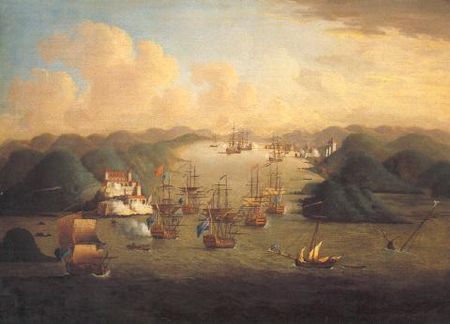Annotation:Portabello Hornpipe: Difference between revisions
No edit summary |
No edit summary |
||
| Line 2: | Line 2: | ||
---- | ---- | ||
<p><font face="garamond, serif" size="4"> | <p><font face="garamond, serif" size="4"> | ||
'''PORTABELLO HORNPIPE.''' AKA - "Portabellow Hornpipe." English, Hornpipe. G Major. Standard tuning (fiddle). AB: AABB. The tune appears in the music manuscript collections of fiddlers William Irwin (1838, Langdale, Cumbria) and Joseph Barnes (1762, Carlisle, Cumbria). The tune perhaps honors the English naval victory against Spain during the War of Jenkin’s Ear (1739-1748), when Admiral Edward Vernon captured the Spanish town of Puerto Bello (now known as Portobelo in the modern-day Panama). The victory was a sensation in England, and in 1740 when Vernon returned to London, he was feted with a dinner in his honor at which the song | '''PORTABELLO HORNPIPE.''' AKA - "Portabellow Hornpipe." English, Hornpipe. G Major. Standard tuning (fiddle). AB: AABB. The tune appears in the music manuscript collections of fiddlers William Irwin (1838, Langdale, Cumbria) and Joseph Barnes (1762, Carlisle, Cumbria). The tune perhaps honors the English naval victory against Spain during the War of Jenkin’s Ear (1739-1748), when Admiral Edward Vernon captured the Spanish town of Puerto Bello (now known as Portobelo in the modern-day Panama). The victory was a sensation in England, and in 1740 when Vernon returned to London, he was feted with a dinner in his honor at which the song “[[God Save the King]]” was performed in public for the first time. [[File:portobello.jpg|450px|thumb|left|The Battle of Porto Bello]] | ||
<br> | <br> | ||
<br> | <br> | ||
Revision as of 13:49, 21 May 2016
Back to Portabello Hornpipe
PORTABELLO HORNPIPE. AKA - "Portabellow Hornpipe." English, Hornpipe. G Major. Standard tuning (fiddle). AB: AABB. The tune appears in the music manuscript collections of fiddlers William Irwin (1838, Langdale, Cumbria) and Joseph Barnes (1762, Carlisle, Cumbria). The tune perhaps honors the English naval victory against Spain during the War of Jenkin’s Ear (1739-1748), when Admiral Edward Vernon captured the Spanish town of Puerto Bello (now known as Portobelo in the modern-day Panama). The victory was a sensation in England, and in 1740 when Vernon returned to London, he was feted with a dinner in his honor at which the song “God Save the King” was performed in public for the first time.

Source for notated version: Callaghan (Hardcore English), 2007; p. 22.
Printed sources: Knowles (A Northern Lass), 1995; p. 39.
Recorded sources: FLP004CD, Florida – “Danse Macabre” (1999). The tune comes from the c. 1850 music manuscript of Lake District musician William Irwin, who titled it "Portobellow Hornpipe" in his MS. Idlewild Recordings, David Spaulding Sharp - "Oaken Leaves" (2010).
See also listing at:
Hear the tune played on whistle by David Spaulding Sharp on youtube.com [1]
